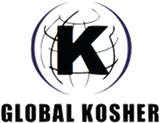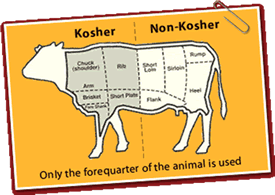| BlueSky Business Aviation News | |||||||||||||||||||||||||
| . | |||||||||||||||||||||||||
For those catering sources in similar situations, the request for religious based dietary catering can become a challenge. As the phone rang recently and the person on the other inquired . . . Do you do Kosher Catering? . . . my staff had to reply “no”, but we can gladly procure the kosher catering for you. Why don’t we produce Kosher catering in-house was the next question. How difficult can it be? Now I ask you, do you understand what Kosher catering means, the requirements necessary when purchasing, preparing, and delivering a kosher meal for a client. And that doesn’t include what is required to prepare a kosher meal on the aircraft. In order to understand what you need to know when working with a food source and ordering Kosher Catering, you must understand the basics of what is Kosher:
The Jewish people have followed the guidelines written in the Torah for thousands of years. As I studied Kosher practices, I was amazed at how advanced the religious doctrines were when it came to food safety. Many of the requirements and guidelines for food handling according to Kashrut and Halakha are the roots found in today’s high tech food hygiene and handling requirements written some 3000 years ago. As you learn more, think about cross contamination, dish and hand cleaning, cooking and processing of foods, the mixing of foods which potentially could create a body’s negative reaction . . . amazing as I think about it! But is Kosher that simple? Isn’t there more? And the answer is yes . . . loads more to know. In a recent conversation with my colleague and friend, Susan C. Friedenberg (Corporate Flight Attendant Training & Consulting), I posed several questions to her about Kosher catering. When I inquired what she considered Kosher catering to mean and its application, she replied: " If you ask 20 Jewish people that observe the laws of eating Kosher in Judaism, 'To what degree are you Kosher?', you will most certainly receive 20 different answers. Kosher is a Hebrew word that literally means “fit” or “proper” and when used in relationship to food products, 'Kosher' means that the item in question meets the dietary requirements of the Jewish law.” The basics of kashrut is the total and complete separation of meat and dairy products. Meat and dairy may not be cooked, eaten or even served together. The authentic kosher kitchen contains two separate sets of dishes, cooking and eating utensils, cookware, refrigeration, as well as a separate preparation areas for meat and dairy. Kosher catering can be a challenge for those who do not have a basic understanding of what constitutes “fit”. All Kosher food that is “fit” is divided into three categories . . . meat, dairy, pareve. Meat
According to the laws of the Torah, to be eaten, a kosher animal must be slaughtered by a "Schochet," a ritual slaughterer. Since Jewish Law prohibits causing any pain to animals, the slaughtering has to be performed in such a way that unconsciousness is instantaneous and death occurs almost instantaneously.” All meat and fowl, including all byproducts of their slaughter and preparation. A byproduct incorporates the bones of the animal, soups, stews, gravies and in many cases gelatin and even some medications made from the byproducts. This also includes any food made with any amount, no matter how small, of meat or foul (called fleishig - Yiddish). Unclean animals such as scavenging birds like vultures, hawks, eagles and birds of prey are not to be eaten, nor any of their byproducts. Any other animal that crawls on the ground, on its belly using all four or more legs are also considered unclean and shouldn’t be eaten. Dairy
Pareve Pareve foods are neither meat or dairy and contain NO meat or dairy - or any derivative or byproduct that have been combined with the food for seasoning or any other reason during the cooking process. For example adding butter to vegetables makes them a dairy food. But, eggs, fish, fruit, vegetables, grains, and juices when unaltered from their natural, unprocessed state are considered pareve foods. Some candies, snacks, pastas, coffee, tea, sodas can also be considered pareve foods . . . but, only until combined with meat or dairy, by using utensils or other kitchen equipment used for dairy or meat. Processed foods or ready-made foods that are prepared should always carry a reputable Kosher certification. Processed foods will lose their pareve status if processed on dairy equipment or when additives are used. The label may give no indication of this processing. Chocolate, cookies and other snacks should not be used with meat or meaty foods unless they are certified pareve.
To be Kosher, fish must have both fins and scales. Simple. Right? Several examples of a Kosher fish would include cod, flounder, haddock, halibut, herring, mackerel, pickerel, pike, salmon, trout, and whitefish. Non-kosher fish include swordfish, shark, eel, octopus, and skate, as well as all shellfish, clams, crabs, lobster, oyster and shrimp since they do not contain BOTH fins and scales. If fish is to remain kosher it must be processed with knives that are used only on fish with skins and scales and not intermixed during the cleaning stage. A kosher fish market is the best bet here, but if your catering source is not a certified kosher kitchen, then when they bring the fish to their kitchen to cook, it is no longer kosher. Be aware that if your catering source uses processed vegetables such as those canned or frozen vegetables, this may pose a problem in receiving Kosher catering. The same rules apply for Kosher production, no seasoning, flavoring, or processed on or in equipment that has come in contact with meat, dairy or non kosher products which contain non kosher foods. If the canned, or frozen vegetables have a meat ingredient, they are to be used only with meat or if dairy is added, they are classified as dairy. Do not assume the catering source will automatically follow kosher guidelines, especially if they are not a certified Kosher facility. Ask. Kosher catering isn’t as simple as calling your catering source . . . knowledge about Kosher dietary laws is essential. If your catering source is asked to procure Kosher catering from another Kosher source, it will come delivered with a local Kosher seal. If the seal is broken, it is no longer Kosher. Since I haven’t seen many aircraft with 2 sinks, 2 ovens, 2 microwaves or even 2 sets of equipment, I again asked Susan how can you have a Kosher aircraft? What is involved? "Kashrut," she responded. "The body of Jewish religious laws concerning the suitability of food - the fitness for use of ritual objects is the actual observance of being Kosher. When you say that an aircraft and its passengers are following the Judaic laws of Kashrut, you will need to ensure the use of plastic plates and utensils and discard them when the meal service is completed. For the aircraft to be Kosher, it must be blessed by a Rabbi and all food must be labeled with the Kosher sign." One interesting fact that Susan passed along to me, was that if a plane is Kosher, then ALL the crew must eat Kosher as well. The crew must adhere to the dietary laws that pertain to Kosher, to the degree that the crew’s owner is Kosher. So, as Susan says . . . ”if a pilot wants ham and cheese sandwich on a Kosher plane, that would be an absolute NO, NO, NO!”
Let me introduce myself . . . My name is Paula Kraft and I am founder and President of Tastefully Yours Catering, an aviation specific caterer, located in Atlanta, Georgia for over 35 years.
Currently I am an active member of the NBAA Flight Attendant Committee Advisory Board and the NBAA International Flight Attendant Committee, Women in Corporate Aviation, Women in Aviation International, National Association of Catering Executives, International Flight Catering Association, the International Food Service Association and the International Caterer’s Association. I have coordinated training programs and clinics for NBAA, EBAA and BA-Meetup conference attendees for over 10 years, created mentoring programs for caterers and flight attendants to broaden their aviation culinary skills, and to assist them in adapting to the unique challenges and constraints found in catering for general aviation. I recognize the need for training and have worked closely with flight departments, flight crews, schedulers and customer service reps at the FBOs to ensure that catering specific training provides information and skills necessary to reduce risk while assisting them in their job duties that include safe food handling, catering security, accurate transmission of food orders, and safe food production, packaging and delivery. I fell into aviation catering quite by accident. I was the in-house caterer and bakery supplier for Macy’s department stores in Atlanta when catering was ordered for a Macy’s customer which was soon to change my life. After the client enjoyed the catering provided, I was summoned to the client’s corporate office to provide several of the items delivered through Macy’s to the executive dining room. Within a week, I was providing food for the flight department and my first order was for the President of a foreign country (as I was too be told soon after). So, here I am, some 35 years later, still loving every minute of every day in aviation catering.
|
|||||||||||||||||||||||||






